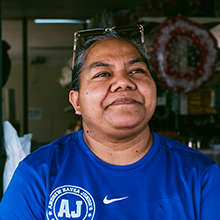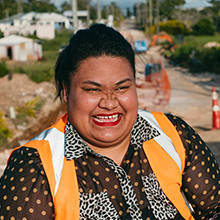Results
Across 20 SIDS in Africa, the Caribbean, and the Pacific, an estimated 3 million people have benefited from World Bank transport projects between 2013 and 2023, and an additional 5 million more people are expected to benefit by 2030. Results achieved span a range of infrastructure improvements and resilience-building exercises—improving and extending roads and bridges, aviation, and maritime infrastructure—with the following examples illustrating a diversity of approaches tailored to the particular needs of a diverse group of states.
In Samoa, the World Bank-supported Enhanced Road Access Project, implemented between 2013 and 2022, and Enhancing the Climate Resilience of the West Coast Road Project, implemented between 2012 and 2020, have provided enhanced access to transport services for the entire population through the upgrade of over 16 km of primary roads and five water crossings to high levels of climate resilience. During severe weather events, businesses in the impacted areas can now operate with fewer disruptions, children miss less school, and the sick or injured can access hospitals more easily and safely.
The Pacific Climate Resilient Transport Program is upgrading vital transport infrastructure to help make communities more resilient to extreme weather events and climate change. While many of the projects are in the early stages of implementation, in 2022 Tonga upgraded two wharves to elevated levels of climate resilience, and in 2023 Samoa upgraded seven km of primary roads and Tonga upgraded an airport, providing elevated levels of climate resilience for this key infrastructure. By 2028, an additional 140+ km of roads and six maritime sites will be made more resilient across the Federated States of Micronesia, Kiribati, Samoa, Tonga, Tuvalu, and Vanuatu. Approximately 45 percent of the population (380,000 people) across the six countries are expected to benefit from greater access to transport services.
In Haiti, the Rural Accessibility & Resilience Project, implemented since 2018, has led to a 27 percent increase in the access of the rural population to all-weather roads that connect them to essential services, through the rehabilitation of 475 km of the tertiary and rural road network. This has provided an additional 71,500 rural women with access to obstetrical and emergency health facilities within 60 minutes and an additional 195,000 people with access to regional size markets within 120 minutes. Prior to the project, most of these networks were in very poor condition and barely trafficable, rendering several regions totally isolated for days at a time during the rainy season and following major storms and hurricanes. In addition, World Bank support has benefited over 400,000 people by strengthening the resilience of the primary and secondary road network to climate change and extreme weather events through the rehabilitation of eight critical bridges and 124 critical spots and segments on the network.
In São Tomé and Príncipe the Transport Sector Development and Coastal Protection Project, approved in 2019 and currently under implementation, is supporting the country’s capacity to manage road assets in a climate resilient manner. Over 13 km of national roads have been made resilient to climate and disaster risk through rehabilitation works, providing access to enhanced transportation for almost 50 percent of the population. With support from the World Bank, a national road climate resilience strategy has also been developed to identify critical road assets and prioritize investment. By 2030, an additional 17 km of national roads will be made resilient to climate risks. Moreover, community-based organizations will be employed to conduct road maintenance with a climate resilience focus, while providing sustainable employment opportunities to women and men throughout the country.



